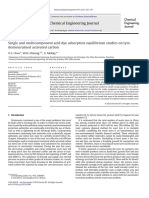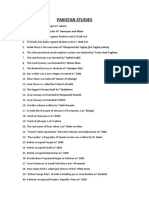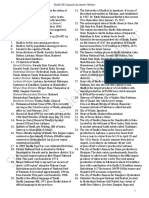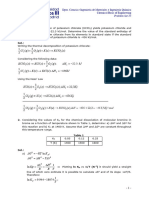Important Scientific Reasoning Question Part 5
Important Scientific Reasoning Question Part 5
Uploaded by
mayrahrajpootCopyright:
Available Formats
Important Scientific Reasoning Question Part 5
Important Scientific Reasoning Question Part 5
Uploaded by
mayrahrajpootOriginal Title
Copyright
Available Formats
Share this document
Did you find this document useful?
Is this content inappropriate?
Copyright:
Available Formats
Important Scientific Reasoning Question Part 5
Important Scientific Reasoning Question Part 5
Uploaded by
mayrahrajpootCopyright:
Available Formats
IER MTE 2011-13
Scientific Reasoning Question Part - V
1. Question: A man with a load jumps from a high building. What will be the load experienced
by him?
Answer: Zero, because while falling, both the man and the load are falling at the same
acceleration i.e. acceleration due to gravity.
2. Question: A piece of chalk when immersed in water emits bubbles. Why?
Answer: Chalk consists of pores forming capillaries. When it is immersed in water, the water
begins to rise in the capillaries and air present there is expelled in the form of bubbles.
3. Question: Why does a liquid remain hot or cold for a long time inside a thermos flask?
Answer: The presence of air, a poor conductor of heat, between the double glass wall of a
thermos flask, keeps the liquid hot or cold inside a flask for a long time.
4. Question: Why does a ball bounce upon falling?
Answer: When a ball falls, it is temporarily deformed. Because of elasticity, the ball tends to
regain its original shape for which it presses the ground and bounces up (Newton's Third Law of
Motion).
5 Question: Why is standing in boats or double decker buses not allowed, particularly in the
upper deck of buses?
Answer: On tilting the centre of gravity of the boat or bus is lowered and it is likely to overturn.
6. Question: Why is it recommended to add salt to water while boiling dal?
Answer: By addition of salt, the boiled point of water gets raised which helps in cooking the dal
sooner.
7. Question: Why is it the boiling point of sea water more than that of pure water?
Answer: Sea water contains salt, and other impurities which cause an elevation in its boiling
point.
8. Question: Why is it easier to spray water to which soap is added?
Answer: Addition of soap decreases the surface tension of water. The energy for spraying is
directly proportional to surface tension.
Visit here for more Education: http://jobsforworld.blogspot.com/p/education.html
IER MTE 2011-13
9. Question: Which is more elastic, rubber or steel?
Answer: Steel is more elastic for the same stress produced compared with rubber.
10. Question: Why is the sky blue?
Answer: Violet and blue light have short waves which are scattered more than red light waves.
While red light goes almost straight through the atmosphere, blue and violet light are scattered
by particles in the atmosphere. Thus, we see a blue sky.
11. Question: Why Does ink leak out of partially filled pen when taken to a higher altitude?
Answer: As we go up, the pressure and density of air goes on decreasing. A Partially filled pen
leaks when taken to a higher altitude because the pressure of air acting on the ink inside the
tube of the pen is greater than the pressure of the air outside.
12. Question: On the moon, will the weight of a man be less or more than his weight on the
earth?
Answer: The gravity of the moon is one-sixth that of the earth; hence the weight of a person on
the surface of the moon will be one-sixth of his actual weight on earth.
13. Question: Why do some liquid burn while others do not?
Answer: A liquid burns if its molecules can combine with oxygen in the air with the production
of heat. Hence, oil burns but water does not.
14. Question: Why can we see ourselves in a mirror?
Answer: We see objects when light rays from them reach our eyes. As mirrors have a shiny
surface, the light rays are reflected back to us and enter our eyes.
Visit here for more Education: http://jobsforworld.blogspot.com/p/education.html
IER MTE 2011-13
15. Question: Why does a solid chunk of iron sink in water but float in mercury?
Answer: Because the density of iron is more than that of water bus less than that of mercury.
16. Question: Why is cooking quicker in a pressure cooker?
Answer: As the pressure inside the cooker increases, the boiling point of water is raised, hence,
the cooking process is quicker.
17. Question: When wood burns it crackles. Explain?
Answer: Wood contains a complex mixture of gases and tar forming vapors trapped under its
surface. These gases and tar vapors escape, making a cracking sound.
18. Question: Why do stars twinkle?
Answer: The light from a star reaches us after refraction as it passes through various layers of
air. When the light passes through the earth? atmosphere, it is made to flicker by the hot and
cold ripples of air and it appears as if the stars are twinkling.
19. Question: Why is it easier to roll a barrel than to pull it?
Answer: Because the rolling force of friction is less than the dynamic force of sliding friction.
20. Question: If a feather, a wooden ball and a steel ball fall simultaneously in a vacuum,
which one of these would fall faster?
Answer: All will fall at the same speed in vacuum because there will be no air resistance and the
earth?s gravity will exert a similar gravitational pull on all.
21. Question: When a man fires a gun, he is pushed back slightly. Why?
Answer: As the bullet leaves the nozzle of the gun? barrel with momentum in a forward
direction, as per Newton's Third Law of Motion, the ejection imparts to the gun as equal
momentum in a backward direction.
22. Question: Ice wrapped in a blanket or saw dust does not melt quickly. Why?
Answer: Both wood and wool are bad conductors of heat. They do not permit heat rays to
reach the ice easily.
23. Question: Why do we perspire on a hot day?
Answer: When the body temperature rises, the sweat glands are stimulated to secrete
perspiration. It is nature's way to keep the body cool. During the process of evaporation of
sweat, body heat is taken away, thus giving a sense of coolness.
Visit here for more Education: http://jobsforworld.blogspot.com/p/education.html
IER MTE 2011-13
24. Question: Why does ice float on water but sink in alcohol?
Answer: Because ice is lighter than water it floats on it. However, ice is heavier than alcohol and
therefore it sinks in alcohol.
25. Question: Why do we perspire before rains?
Answer: Before the rain falls, the atmosphere gets saturated with water vapors; as a result, the
process of evaporation of sweat is delayed.
26. Question: Why does a thermometer kept in boiling water show no change in reading after
1000C?
Answer: The boiling point of water is 1000C. Once water starts boiling at this temperature,
thermometer records no change in temperature. The quantity of heat supplied is being utilized
as latent heat of evaporation to convert the water at boiling point into vapour.
27. Question: Why do we bring our hands close to the mouth while shouting across to
someone far away?
Answer: By keeping hands close to mouth the sound is not allowed to spread (Phenomenon of
diffraction of sound) in all direction, but is directed to a particular direction and becomes
louder.
28. Question: Why does a corked bottle filled with water burst if left out on a frosty night?
Answer: Because of low temperature the water inside the bottle freezes. On freezing it
expands, thereby its volume increases and pressure is exerted on the walls.
29. Question: Why is a small gap left at the joint between two rails?
Answer: To permit expansion of rails due to heat generated by friction of a moving train.
30. Question: Why cannot a copper wire be used to make elements in electric heater?
Answer: Copper melts at 108.30C and forms a black powder on reacting with atmospheric
oxygen. For heater elements a metal should have more resistance to produce heat.
31. Question: Why are water or mercury droplets always round when dropped on a clean
glass?
Answer: The surface of a liquid is the seat of a special force as a result of which molecules on
the surface are bound together to form something like a stretched membrane. They tend to
compress the molecules below to the smallest possible volume, which causes the drop to take a
Visit here for more Education: http://jobsforworld.blogspot.com/p/education.html
IER MTE 2011-13
round shape as for a given mass he sphere has minimum volume.
32. Question: Why does a balloon filled with hydrogen rise in the air?
Answer: Weight of hydrogen is less than the weight of air displaced by it. In balloons hydrogen
is normally filled because it is lighter than air.
33. Question: Why do we lean forward while climbing a hill?
Answer: In order to keeps the vertical line passing through our centre of gravity always
between our feet, which is essential to attain equilibrium or stability.
34. Question: Why does smoke curl up in the air?
Answer: Smoke contains hot gases which being lighter in weight, follows a curved path because
of the eddy currents that are set up in the air.
35. Question: Why does an electric bulb explode when it is broken?
Answer: The bulb encompasses partial vacuum and as it breaks, air rushes in causing a small
explosion.
36. Question: Why does a man fall forward when he jumps out of a running train or bus?
Answer: He is in motion while in the train or bus. When he jumps out, his feet comes to rest
while touching the ground but his upper portion which is still in motion propels him forward.
37. Question: Why does an ordinary glass tumbler crack when very hot tea or milk is poured
in it?
Answer: When a hot liquid is poured into a tumbler, the inner layer of the tumbler gets heated,
it expands before the outer layer and an unequal expansion of both layers causes the tumbler
to crack.
38. Question: Why is a compass used as an indicator of direction?
Answer: The magnetic needles of a compass under the influence f the earth? magnetic field lie
in a north-south direction. Hence, we can identify direction.
39. Question: Why is water from a hand pump warm in winter and cold in summer?
Answer: In winter, the outside temperature is lower than that of water flowing out of the
pump, and therefore, the water is warm. Whereas in summer, the outside temperature is
higher than the water of the pump, and therefore, it feels cold.
Visit here for more Education: http://jobsforworld.blogspot.com/p/education.html
IER MTE 2011-13
40. Question: Why is a rainbow seen after a shower?
Answer: After a shower, the clouds containing water droplets act like a prism through which the
white light is dispersed producing a spectrum.
41. Question: Why does a swimming pool appear less deep than is actually is?
Answer: The rays of light coming from the bottom of the pool pass from a denser medium
(water) to a rarer medium (air) and are refracted (bend away from the normal). When the rays
return to the surface, they form an image of the bottom of the pool at a point, which is little
above the real position.
42. Question: Why is one?s breath visible in winter but not in summer?
Answer: In winter, water vapor contained in the breath condenses into small droplets, which
become visible but in summer they are quickly evaporated and not seen.
43. Question: Why doesn?t the electric filament in an electric bulb burn up?
Answer: Firstly, because is made of tungsten which has a very high melting point (34100C)
whereas the temperature of the filament required to glow is only 2700oC. Secondly, oxygen is
absent since the bulb is filled with an inert gas which does not help in burning.
44. Question: Why does blotting paper absorb ink?
Answer: Blotting paper has fine pores, which act like capillaries. When a portion of blotting
paper is brought in contact with ink, ink enters the pores due to surface tension (capillary
action f liquids) and is absorbed.
45. Question: Why does a small iron sink in water but a large ship float?
Answer: The weight of water displaced by an iron ball is less than its own weight, whereas
water displaced by the immersed portion of a ship is equal to its weight (Archimedes?
Principle).
46. Question: Why does ice float on water?
Answer: The weight of the ice block is equal to the weight of the liquid displaced by the
immersed portion of the ice.
47. Question: Why does moisture gather outside a tumbler containing cold water?
Answer: The water vapour in the air condenses on cooling and appears as droplets of water.
48. Question: Why does kerosene float on water?
Visit here for more Education: http://jobsforworld.blogspot.com/p/education.html
IER MTE 2011-13
Answer: Because the density of kerosene is less than that of water. For the same reason cream
rises in milk and floats at the top.
49. Question: Why is the water in an open pond cool even on a hot summer day?
Answer: As the water evaporates from the open surface of a pond, heat is taken away in the
process, leaving the surface cool.
50. Question: Why is it less difficult to cook rice or potatoes at higher altitudes?
Answer: Atmospheric pressure at higher altitudes is low and boils water below 100C. The
boiling point of water is directly proportional to the pressure on its surface.
51. Question: Why is it difficult to breathe at higher altitudes?
Answer: Because of low air pressure at higher altitudes the quantity of air is less, and so that of
oxygen.
52. Question: Why are winter nights and summer nights warmer during cloudy weather than
when the sky is clear?
Answer: Clouds being bad conductors of heat do not permit radiation of heat from land to
escape into the sky. As this heat remains in the atmosphere, the cloudy nights are warmer.
53. Question: Why is a metal tyre heated before it is fixed on wooden wheels?
Answer: On heating, the metal tyre expands by which its circumference also increases. This
makes fixing the wheel easier and therefore cooling down shrinks it; thus fixing the tyre tightly.
54. Question: Why is it easier to swim in the sea than in a river?
Answer: The density of sea water is higher; hence the up thrust is more than that of river
water.
55. Question: Who will possibly learn swimming faster-a fat person or a thin person?
Answer: The fat person displaces more water which will help him float much more freely
compared to a thin person.
56. Question: Why is a flash of lightening seen before thunder?
Answer: Because light travels faster than sound, it reaches the earth before the sound of
thunder.
57. Question: Why cannot a petrol fire be extinguished by water?
Answer: Water, which is heavier than petrol, slips down permitting the petrol to rise to the
Visit here for more Education: http://jobsforworld.blogspot.com/p/education.html
IER MTE 2011-13
surface and continue to burn. Besides, the existing temperature is so high that the water
poured on the fire evaporates even before it can extinguish the fire. The latter is true if a small
quantity of water is poured.
58. Question: Why does water remain cold in an earthen pot?
Answer: There are pores in an earthen pot which allow water to percolate to the outer surface.
Here evaporation of water takes place thereby producing a cooling effect.
59. Question: Why do we place a wet cloth on the forehead of a patient suffering from high
temperature?
Answer: Because of body? temperature, water evaporating from the wet cloth produces a
cooling effect and brings the temperature down.
60. Question: When a needle is placed on a small piece of blotting paper which is place on the
surface of clean water, the blotting paper sinks after a few minutes but the needle floats.
However, in a soap solution the needle sinks. Why?
Answer: The surface tension of clean water being higher than that of a soap solution, it cans
support the weight of a needle due to its surface tension. By addition of soap, the surface
tension of water reduces, thereby resulting in the sinking of the needle.
61. Question: To prevent multiplication of mosquitoes, it is recommended to sprinkle oil in
the ponds with stagnant water. Why?
Answer: Mosquitoes breed in stagnant water. The larvae of mosquitoes keep floating on the
surface of water due to surface tension. However, when oil is sprinkled, the surface tension is
lowered resulting in drowning and death of the larvae.
62. Question: Why does oil rise on a cloth tape of an oil lamp?
Answer: The pores in the cloth tape suck oil due to the capillary action of oil.
63. Question: Why are ventilators in a room always made near the roof?
Answer: The hot air being lighter in weight tends to rise above and escape from the ventilators
at the top. This allows the cool air to come in the room to take its place.
64. Question: How does ink get filled in a fountain pen?
Answer: When the rubber tube of a fountain pen immersed in ink is pressed, the air inside the
tube comes out and when the pressure is released the ink rushes in to fill the air space in the
Visit here for more Education: http://jobsforworld.blogspot.com/p/education.html
IER MTE 2011-13
tube.
65. Question: Why are air coolers less effective during the rainy season?
Answer: During the rainy reason, the atmosphere air is saturated with moisture. Therefore, the
process of evaporation of water from the moist pads of the cooler slows down thereby not
cooling the air blown out from the cooler.
66. Question: Why does grass gather more dew in nights than metallic objects such as
stones?
Answer: Grass being a good radiator enables water vapour in the air to condense on it.
Moreover, grass gives out water constantly (transpiration) which appears in the form of dew
because the air near grass is saturated with water vapour and slows evaporation. Dew is
formed on objects which are good radiations and bad conductors.
67. Question: If a lighted paper is introduced in a jar of carbon dioxide, its flame extinguishes.
Why?
Answer: Because carbon dioxide does not help in burning. For burning, oxygen is required.
68. Question: Why does the mass of an iron increase on rusting?
Answer: Because rust is hydrated ferric oxide which adds to the mass of the iron rod. The
process of rusting involves addition of hydrogen and oxygen elements to iron.
69. Question: Why does milk curdle?
Answer: Lactose (milk sugar) content of milk undergoes fermentation and changes into lactic
acid which on reacting with milk protein (casein) form curd.
70. Question: Why does hard water not lather soap profusely?
Answer: Hard water contains sulphates and chlorides of magnesium and calcium which forms
an insoluble compound with soap. Therefore, soap does not lather with hard water.
71. Question: Why is it dangerous to have charcoal fire burning in a closed room?
Answer: When charcoal burns it produces carbon monoxide which is suffocating and can cause
death.
72. Question: Why is it dangerous to sleep under trees at night?
Answer: Plants respire at night and give out carbon dioxide which reduces the oxygen content
of air required for breathing.
Visit here for more Education: http://jobsforworld.blogspot.com/p/education.html
IER MTE 2011-13
73. Question: Why is a new quilt warmer than an old one?
Answer: In a new quilt the cotton is not compressed and as such it encloses more air which is
bad conductor of heat. Therefore, it does not allow heat to pass.
74. Question: Curved rail tracks or curved roads are banked or raised on one side. Why?
Answer: Because a fast moving train or vehicle leans inwards while taking turn and the banked
or raised track provides required centripetal force to enable it to move round the curve.
75. Question: How do bats fly in dark?
Answer: When bats fly they produce ultrasonic sound waves which are reflected back to them
from the obstacles in their way and hence they can fly without difficulty.
76. Question: Water pipes often burst at hill stations on cold frosty nights. Why?
Answer: The temperature may fall below 00C during cold frosty nights which converts the
water inside the pipes into ice, resulting in an increase in volume. This exerts great force on the
pipes and as a result, they burst.
77. Question: Why are white clothes more comfortable in summer than dark or black ones?
Answer: White clothes are good reflectors and bad absorbers of heat, whereas dark or black
clothes are good absorbers of heat. Therefore, white clothes are more comfortable because
they do not absorb heat from the sun rays.
78. Question: Why does a rose appear red grass green in daylight?
Answer: Rose absorbs all the constituent colors of white light except red which is reflected to
us. Similarly, grass absorbs all colors except green which is reflected t us.
79. Question: Why does a ship rise as it enters the sea from a river?
Answer: The density of sea water is high due to impurities and salts compared to river water as
a result; the upthurst produced by the sea water on the ship is more than that of river water.
80. Question: Why are fuse provided in electric installations?
Answer: A safety fuse is made of a wire of metal having a very low melting point. When excess
current flows in, the wire gets heated, melts and breaks the circuit. By breaking the circuit it
saves electric equipment or installations from damage by excessive flow of current.
81. Question: Why is it easier to lift a heavy object under water than in air?
Answer: Because when a body is immersed in water, it experiences an upward thrust
Visit here for more Education: http://jobsforworld.blogspot.com/p/education.html
IER MTE 2011-13
(Archimedes? Principle) and loses weight equal to the weight of the water displaced by its
immersed potion, and hence, is easier to lift objects.
82. Question: If a highly pumped up bicycle tyre is left in the hot sunlight, it bursts. Why?
Answer: The air inside the tube increases in volume when heated up. As sufficient space for the
expansion of the air is not available because the tube is already highly pumped, it may result in
bursting of the tyre.
83. Question: What will be the color of green in blue light?
Answer: Grass will appear dark in color because it absorbs all other colors of the light except its
own green color. The blue light falling on grass will be absorbed by it, and hence, it will appear
dark in color.
84. Question: Why do two eyes give better vision than one?
Answer: Because two eyes do not form exactly similar images and he fusion of these two
dissimilar images in the brain gives three dimensions of the stereoscopic vision
Visit here for more Education: http://jobsforworld.blogspot.com/p/education.html
You might also like
- Geography of SindhDocument15 pagesGeography of SindhKavita Krishna Moorti100% (2)
- Class 6 Science: Shah SeriesDocument16 pagesClass 6 Science: Shah SeriesAgha Khan DurraniNo ratings yet
- Urdu Essay PDFDocument52 pagesUrdu Essay PDFAzhar Khalid100% (2)
- PPSCC CCE PMS Islamiyat MCQsDocument24 pagesPPSCC CCE PMS Islamiyat MCQsUroo ShaikhNo ratings yet
- Organizations Joined by Pakistan PDFDocument25 pagesOrganizations Joined by Pakistan PDFrafiNo ratings yet
- Pak Affair 1900-1947Document5 pagesPak Affair 1900-1947Sher Gull HisbaniNo ratings yet
- Sindh GK CapsuleDocument69 pagesSindh GK CapsuleSindh Jobs Helper100% (2)
- Csstimes - Pk-Geography of World Solved MCQs For CSS PMS NTS GK Paper Part-3Document14 pagesCsstimes - Pk-Geography of World Solved MCQs For CSS PMS NTS GK Paper Part-3imranNo ratings yet
- McqsDocument19 pagesMcqsFaYsal ChNo ratings yet
- Important Days of PakistanDocument2 pagesImportant Days of PakistanMir100% (2)
- Assistant Food ControllerDocument2 pagesAssistant Food ControllerAsif Khan Shinwari67% (3)
- Subcontinent History 712 To 1947: Visit For More PDF McqsDocument7 pagesSubcontinent History 712 To 1947: Visit For More PDF McqsHaseeb AkbarNo ratings yet
- Thermal MassDocument21 pagesThermal MassRadmila TomovskaNo ratings yet
- UCLA Astronomy 3 Practice ExamDocument7 pagesUCLA Astronomy 3 Practice ExamSharon XuNo ratings yet
- Multi Component IsothermsDocument9 pagesMulti Component IsothermsTDSNo ratings yet
- Everyday Science Questions Answered - Part 1: Author: Administrator Saved FromDocument3 pagesEveryday Science Questions Answered - Part 1: Author: Administrator Saved Frommrasad100% (1)
- Pakistan Studies S.S.C - 1 Chapter - 2 Making of Pakistan MCQ'SDocument4 pagesPakistan Studies S.S.C - 1 Chapter - 2 Making of Pakistan MCQ'Smushtaq0% (1)
- History of Subcontinent Important MCQs in PDFDocument6 pagesHistory of Subcontinent Important MCQs in PDFAzad SamiNo ratings yet
- World Rivers - World General Knowledge MCQsDocument7 pagesWorld Rivers - World General Knowledge MCQsAzad SamiNo ratings yet
- 9th English Paragraph English To Urdu NotesDocument8 pages9th English Paragraph English To Urdu NotesWaqas Ahmad AwanNo ratings yet
- (Unit 4) The Great Visionaries (: Questions and Answers)Document2 pages(Unit 4) The Great Visionaries (: Questions and Answers)Wikki Wasif100% (2)
- Treaties and Agreements PPSCDocument3 pagesTreaties and Agreements PPSCMuhammad100% (1)
- Important Titles of Prophets and Companions in Islam - MCQsDocument9 pagesImportant Titles of Prophets and Companions in Islam - MCQsMehak FatimaNo ratings yet
- Everyday Science One LinerDocument25 pagesEveryday Science One LinerFaisal100% (1)
- 10th-English-Notes-Translation-Urdu-to-English-Notes-StudyNowPK.COM_Document13 pages10th-English-Notes-Translation-Urdu-to-English-Notes-StudyNowPK.COM_Tabasum MirNo ratings yet
- TranslationDocument22 pagesTranslationAbdul Haleem RekiNo ratings yet
- Pakistan Studies MCQSDocument11 pagesPakistan Studies MCQSlozney9183% (6)
- Lakes of The World MCQs - World General Knowledge SeriesDocument7 pagesLakes of The World MCQs - World General Knowledge SeriesMuhammad FarooqNo ratings yet
- MCQ Bank For Pak Studies 2024Document12 pagesMCQ Bank For Pak Studies 2024SARMAD ALI100% (2)
- PMS Screening Test Solved PastDocument7 pagesPMS Screening Test Solved PastSultan Shah100% (1)
- Pak StudyDocument15 pagesPak StudyanyanyNo ratings yet
- Rivers of The World MCQs - World General Knowledge SeriesDocument7 pagesRivers of The World MCQs - World General Knowledge Seriessanaullah100% (1)
- Everyday Science Set 1 One LineDocument36 pagesEveryday Science Set 1 One LineMuarij AnwarNo ratings yet
- General Science and Ability CSS Past Paper Part 1Document40 pagesGeneral Science and Ability CSS Past Paper Part 1Eshal MalikNo ratings yet
- Pakistan Movement MCQSDocument23 pagesPakistan Movement MCQSDISTRICT FOOD CONTROLLER Muzaffargarh100% (1)
- English PaperDocument7 pagesEnglish PaperhamzaNo ratings yet
- Pakistan Rivers, Mountains, Lakes, Passes EtcDocument3 pagesPakistan Rivers, Mountains, Lakes, Passes EtcimranNo ratings yet
- Comprehension Passages (CSS 2000 - 2019)Document19 pagesComprehension Passages (CSS 2000 - 2019)Muhammad AsifNo ratings yet
- 350 Pakistan Studies Most Important Solved QuestionsDocument21 pages350 Pakistan Studies Most Important Solved QuestionsALEEM JAFAR WATTOO100% (1)
- Abbreviation ListDocument3 pagesAbbreviation ListHimesh Rutherford100% (4)
- 10th Pak Studies Solved MCQS (Bismillah) EditDocument9 pages10th Pak Studies Solved MCQS (Bismillah) Editirfan1703100% (3)
- Pakistan Affairs - Important Constitutional Development MCQsDocument8 pagesPakistan Affairs - Important Constitutional Development MCQssami xainNo ratings yet
- All Important MCQSDocument7 pagesAll Important MCQSImran100% (2)
- Pakistan Studies MCQs (Pakistan Movement) For FPSC, PMS, PCS, NTSDocument7 pagesPakistan Studies MCQs (Pakistan Movement) For FPSC, PMS, PCS, NTSimtiaz_ahmed771100% (1)
- India and Pakistan MCQsDocument12 pagesIndia and Pakistan MCQsF219208 Muhammad Ahmad ShakeelNo ratings yet
- Physics Chapter 12 Xii Sindh BoardDocument30 pagesPhysics Chapter 12 Xii Sindh BoardAbdulRehman100% (3)
- Paragraph 1:: I Income, PricesDocument11 pagesParagraph 1:: I Income, PricesSana BibiNo ratings yet
- Sindh GK Capsule Part 1Document4 pagesSindh GK Capsule Part 1Irfan Dahri100% (1)
- Most Important MCQs About OIC (Organisation of Islamic Cooperation) PDFDocument4 pagesMost Important MCQs About OIC (Organisation of Islamic Cooperation) PDFJatoi Akhtar100% (3)
- Most Repeated Mcqs in PPSC Past PapersDocument4 pagesMost Repeated Mcqs in PPSC Past PapersEngr Ghulam Mustafa0% (1)
- About Balochistan Pakistan Study mcqs3 PDFDocument20 pagesAbout Balochistan Pakistan Study mcqs3 PDFfaisal maqboolNo ratings yet
- Geography of Pakistan MCQs - Pakistan Studies - Affairs Notes (Set-I)Document9 pagesGeography of Pakistan MCQs - Pakistan Studies - Affairs Notes (Set-I)Aar Tech CareNo ratings yet
- An Astronomer'S View of The Universe: Questions & AnswersDocument2 pagesAn Astronomer'S View of The Universe: Questions & AnswersKhalil Ahmed100% (2)
- Collective IBA Sample PapersDocument15 pagesCollective IBA Sample PapersSindh Jobs HelperNo ratings yet
- First, Largest, SmallestDocument5 pagesFirst, Largest, Smallesthoney chemistNo ratings yet
- Pakistan Joined International Organization by Shan Ali JunejoDocument3 pagesPakistan Joined International Organization by Shan Ali JunejoShan AliNo ratings yet
- 02-Cabinet Division Assistant IslamabadDocument2 pages02-Cabinet Division Assistant IslamabadAYESHA SHAZ67% (3)
- 1000 MCQs One Paper Book (Everydays Science) by TestPoint - PKDocument65 pages1000 MCQs One Paper Book (Everydays Science) by TestPoint - PKFarhanAwaisi100% (2)
- Quaid e Azam Day Speech in English3Document2 pagesQuaid e Azam Day Speech in English3Zeeshan Ali50% (2)
- Answer: The Gravity of The Moon Is One-Sixth That of The Earth Hence The Weight of A Person OnDocument7 pagesAnswer: The Gravity of The Moon Is One-Sixth That of The Earth Hence The Weight of A Person OnRahul DubeyNo ratings yet
- GKS - 2ndDocument55 pagesGKS - 2ndHanif KhetranNo ratings yet
- Everyday ScienceDocument10 pagesEveryday ScienceNajamNawazNo ratings yet
- Everyday Science Questions & Answers - EverydayDocument4 pagesEveryday Science Questions & Answers - Everydaykshk ryNo ratings yet
- Effective Strengthening of Reinforced Concrete Corbels Using Post-TensioningDocument17 pagesEffective Strengthening of Reinforced Concrete Corbels Using Post-TensioningAlaa tahaNo ratings yet
- Chapter 3 Stage and Continuous Gas Liquid Separation Processes PDFDocument46 pagesChapter 3 Stage and Continuous Gas Liquid Separation Processes PDFazim100% (1)
- Biotech J 2016 - CFIR For Continuous PrecipitationDocument12 pagesBiotech J 2016 - CFIR For Continuous PrecipitationlaasyagudiNo ratings yet
- Endless Rod - Lifting SolutionsDocument1 pageEndless Rod - Lifting Solutionsnambaway unsaidNo ratings yet
- PD 4341 V09 Sthamex Afff - 3% - F 15 - #4341 enDocument2 pagesPD 4341 V09 Sthamex Afff - 3% - F 15 - #4341 enLuke WilsonNo ratings yet
- (123doc) Phuong Trinh Hoa Hoc Lop 10 Chuong 56Document4 pages(123doc) Phuong Trinh Hoa Hoc Lop 10 Chuong 56Thanh Thảo Hoàng100% (1)
- Lab Report Ceramic ShrinkageDocument4 pagesLab Report Ceramic Shrinkagenadeem ranaNo ratings yet
- Avolan IsDocument3 pagesAvolan IsIván Cuevas100% (1)
- Hootagalli Industrial Area, Off, Hunsur RD, Mysuru, Anagahalli, Karnataka 570018Document3 pagesHootagalli Industrial Area, Off, Hunsur RD, Mysuru, Anagahalli, Karnataka 570018hhematiradalliNo ratings yet
- VectorsDocument10 pagesVectorsapi-3710134No ratings yet
- Exercises-Topic 5Document5 pagesExercises-Topic 5Arturo AtienzaNo ratings yet
- Chemistry Presentation On GlowsticksDocument10 pagesChemistry Presentation On GlowsticksVeer PrajapatiNo ratings yet
- Chemistry Grade 12 Electrochemical Reactions Part 1Document7 pagesChemistry Grade 12 Electrochemical Reactions Part 1mahafamorongwaNo ratings yet
- SR Chemistry 30-40 MarksDocument5 pagesSR Chemistry 30-40 Markssuranenisannik.bh23No ratings yet
- Séparations Chirales Par CPL, Cps Et CPG: P O U R E N S A V O I R P L U SDocument5 pagesSéparations Chirales Par CPL, Cps Et CPG: P O U R E N S A V O I R P L U SOualidNo ratings yet
- Report On Hall EffectDocument5 pagesReport On Hall EffectKhatri RaviNo ratings yet
- Null 2Document24 pagesNull 2Muhammad FaizanNo ratings yet
- Science9 - q2 - Mod1 - Mechanical Model of The Atom - v3Document31 pagesScience9 - q2 - Mod1 - Mechanical Model of The Atom - v3Kristine Ibarreta-Jazul100% (1)
- 9100 Et ET 3 PDFDocument14 pages9100 Et ET 3 PDFTanaya MishraNo ratings yet
- SdarticleDocument9 pagesSdarticleaveryNo ratings yet
- Review Sheet-Exam 1 - 21, 22, 23, 24Document12 pagesReview Sheet-Exam 1 - 21, 22, 23, 24Desiree WilliamsNo ratings yet
- Powerpoxi GeralDocument28 pagesPowerpoxi Geralisis.com.calinaNo ratings yet
- Waves Reading PassageDocument2 pagesWaves Reading PassagedavidNo ratings yet
- Explosives Sampling SystemDocument2 pagesExplosives Sampling SystembernardinodinoNo ratings yet
- ElectroGravitics 01 PDFDocument132 pagesElectroGravitics 01 PDFCalhoun100% (1)
- AQA GCSE Chemistry of The Atmosphere Multiple Choice Questions Set 4Document3 pagesAQA GCSE Chemistry of The Atmosphere Multiple Choice Questions Set 4ValNo ratings yet
- Information and Applications of BmsDocument44 pagesInformation and Applications of Bmsapi-324119707No ratings yet

























































































